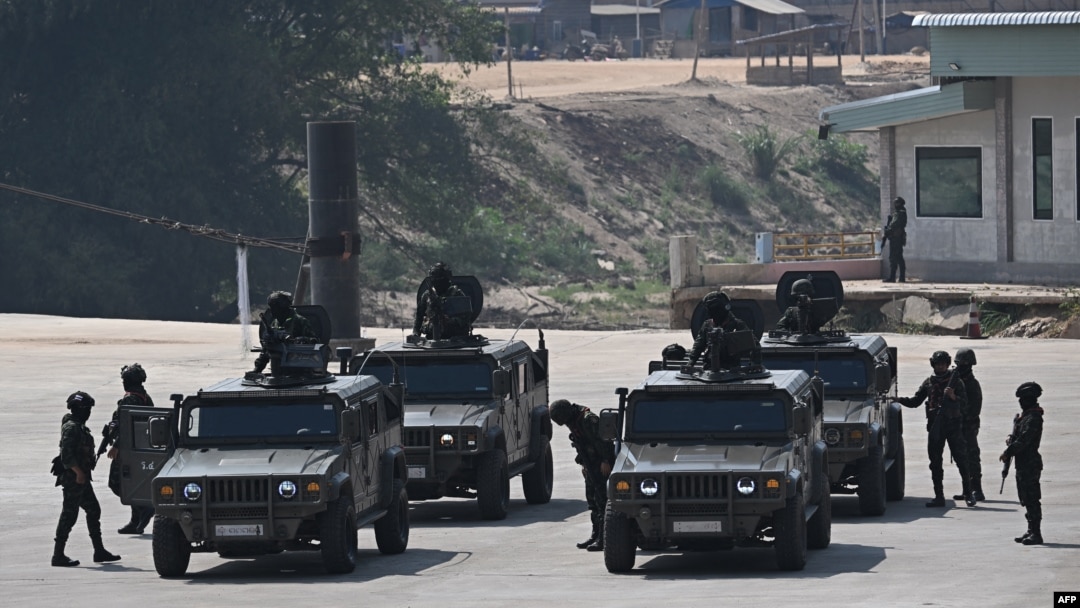An influential lawyers’ association in Thailand said Thursday it is launching an investigation into the alleged killing of a Myanmar man by Thai soldiers last year, a move it says could lead to lawsuits against any officers involved.
The Lawyers Council of Thailand, which accredits the country’s attorneys, announced the probe after accepting a formal complaint about the case from Fortify Rights, an international advocacy group that previously carried out an investigation into the case.
In a report published last year, Fortify Rights alleged that three unidentified soldiers brutally beat Aung Ko Ko to death with bamboo rods in Baan Tai village, near the Myanmar border, on January 12, 2024, after disputing his membership in a security patrol team made up of local civilians.
The courts never charged any soldiers in the case, but convicted another civilian and Myanmar national, Sirachuch, who goes by one name, with manslaughter in September. Fortify Rights claims Sirachuch is being used as a scapegoat. Sirachuch has said he saw the soldiers attack Aung Ko Ko.
“After the Lawyers Council has taken the complaint, we will then investigate the nature and circumstances of the death of Aung Ko Ko. After that, we will take appropriate legal action,” Council President Wichien Chubthaisong told a press conference in Bangkok announcing the move.
“We will set up a subcommittee to conduct a fact-finding operation, hoping this will lead to the consideration of legal aid services and ensure that justice prevails for the family of Aung Ko Ko,” he added.
“Everyone has the right to have their human rights protected and respected under the law. Citizens in general should not be punished arbitrarily,” the chairman said.
Afterward, Wichien told VOA the evidence that Fortify Rights has gathered implicating the army appeared credible and that the council could pursue civil or criminal charges against any soldiers it identifies as suspects.
“With credible evidence and a strong case, I think what we can continue to do is to prosecute other people involved in this case,” he said.
Neither the Royal Thai Armed Forces nor the Royal Thai Police, which investigated Aung Ko Ko’s death last year and filed the charges that led to Sirachuch’s conviction, replied to VOA’s requests for comment.
Fortify Rights says the army has denied any responsibility for Aung Ko Ko’s death, both to local media and a House of Representatives committee hearing, claiming he was tortured on the Myanmar side of the border before his body was dumped on Thai soil.
The rights group denies the army’s claim and says it undermines the authorities’ case against Sirachuch, which rests on Thailand having jurisdiction over an attack by Sirachuch on Aung Ko Ko in Thailand.
Sirachuch, who is now serving a prison sentence of three years and four months, confessed to striking Aung Ko Ko once on the back and twice on the shins.
Fortify Rights, though, says that falls well short of manslaughter. It says the post-mortem report by the hospital that examined Aung Ko Ko’s body states he died of “head injuries caused by physical assault,” and that three eyewitnesses to the attack, Sirachuch included, claim it was the soldiers who beat Aung Ko Ko on the head.
“This is a grave miscarriage of justice at multiple levels and we are very heartened to see Thai leaders like Dr. Wichien willing to take a closer look at this case,” Fortify Rights CEO Matthew Smith said at Thursday’s press conference.
Afterward, Smith said his group pursued the council’s help because of its influence and connections with Thai authorities, especially its links to the Department of Special Investigation, or DSI. The department is a special Ministry of Justice unit that investigates some of the country’s highest profile and sensitive cases, including those that may involve public corruption and abuse of power. Wichien is on the department’s board of special cases, which guides its work and is chaired by Prime Minister Paetongtarn Shinawatra.
“So, the fact that the Lawyers Council is willing to take a closer look at this case, we hope, is one important step closer to DSI also doing a formal investigation,” Smith told VOA.
“This is the type of situation where DSI can get involved and actually uncover the truth and ensure actual justice takes place,” he added. “In some ways, DSI can unravel coverups, and DSI has the skills and ability and the influence and power to ensure justice in these really difficult cases.”
In its report on Aung Ko Ko’s death, Fortify Rights says it interviewed 23 people during its investigation, including witnesses, acquaintances and relatives, and spoke with local police. It says he had been living in Thailand for many years and was a well-known member of the community’s civilian security team, known locally as Chor Ror Bor, which is trained and organized by Thai authorities.
The report says the soldiers who detained Aung Ko Ko the day he died, and who later beat him, disputed his membership in the team, even after other members arrived to vouch for him. After the attack, it adds, Aung Ko Ko, badly bruised and bloodied, was being helped to the Myanmar border by other locals, on orders from the soldiers, when he collapsed and died of his wounds.


